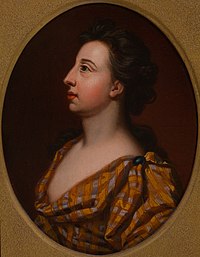Elizabeth Barry
These three roles, wrote the prompter John Downes, "gain'd her the Name of Famous Mrs. Barry, both at Court and City, for whenever She Acted any of these three Parts, she forc'd Tears from the Eyes of her Auditory, especially those who have any Sense of Pity for the Distress't."
In his autobiography, many years later, Colley Cibber recalled the power of her voice: "When distress of Tenderness possess'd her, she subsided into the most affecting Melody and Softness.
Elizabeth Howe has argued that it was Barry's success in the role of Monimia that "clinched the movement away from heroic drama and started the establishment of 'she-tragedy' as a popular genre."
Portraits suggest intelligence but heavy features and the playwright Thomas Shadwell writes in a letter in 1692 that it would have been better to have staged Nicholas Brady's The Rape in Roman dress, "and then w'th a Mantle to have covered her hips Mrs Barry would have acted ye part."
Thus Otway uses the dismemberment of the female body, expressed through the "mangled breasts besmeared with blood", to signify the ruin of the state".
One year after her performance in The Fatal Marriage, Barry decided to leave the United Company due to a salary dispute in 1695.
Barry was one of the original patent-holders of the actors' company, which opened at Lincoln's Inn Fields with the smash hit of William Congreve's Love For Love in 1695 and continued to successfully challenge Rich's United Company.There was a huge wage gap between men and woman performers as Betterton was paid £4 and 20s per week and Barry received only £2 and 10s shillings.
Barry is a supporting character in The Libertine, Stephen Jeffreys' play about John Wilmot's life, as well as its 2004 film adaptation, in which she is portrayed by Samantha Morton.

